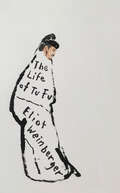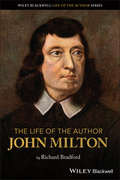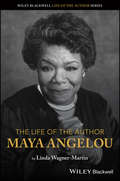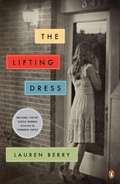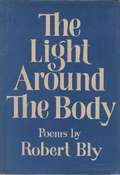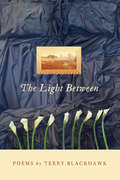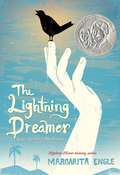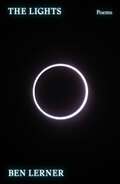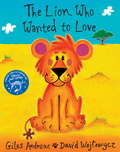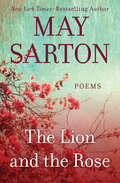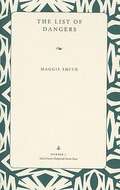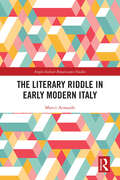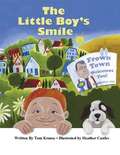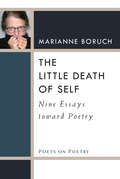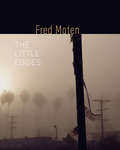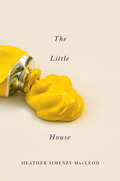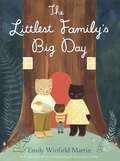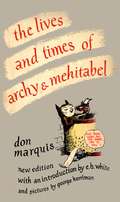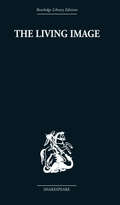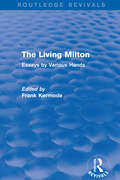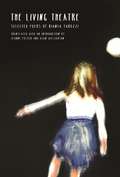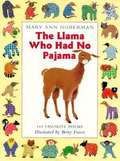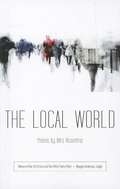- Table View
- List View
The Life of Tu Fu
by Eliot WeinbergerA book-length poem by “our best living literary essayist” (Forrest Gander). For over fifty years Eliot Weinberger has been celebrated for his innovative literary and political essays—translated into over thirty languages—as well as his trailblazing translations from the Spanish. In his exquisite new book The Life of Tu Fu, Weinberger has composed a montage of fifty-eight poems that capture the life and times of the great Tang Dynasty poet Tu Fu (712–770 AD). As he writes in a note to the edition, “This is not a translation of individual poems, but a fictional autobiography of Tu Fu derived and adapted from the thoughts, images, and allusions in the poetry.” Through lines as penetrating as a classical tanka and as fluid as a mountain stream, themes of endless war and ongoing pandemic surround the wandering life of the ancient Chinese master.
The Life of the Author: John Milton (The Life of the Author)
by Richard BradfordTHE LIFE OF THE AUTHOR An expansive biography of John Milton, including an assessment of his poetry and prose and an account of the ways in which he has been presented over the past three and a half centuries—written by a leading scholar in the fieldIt is hard to overstate the role that John Milton played in the historical, political and literary controversies of seventeenth century England; his writings and very life challenged the status quo. Living through one of the most tumultuous periods in British history, Milton was involved at every turn. Struggling to reconcile his private beliefs with his involvement with a radical political experiment, a republic which involved the killing of the monarch, his star rose and fell several times during his life. Married three times, struck blind at a cruelly early age, he was a famed pamphleteer and political activist whose revolutionary political credos placed him in mortal danger after the Restoration. Milton’s varied life makes for fascinating reading but it also produced some of the most important poetry in the English language. Paradise Lost, the only poem in English recognized as an epic, challenged conventional thinking on widespread topics from religion and gender equality to the fundamental question of why we behave as we do.This fascinating new biography is divided into two parts. The first separates the man from the myth, and elucidates the complicated details of Milton’s life from his early years as a literary artist uncertain of his destiny, through his work as a propagandist for the Cromwellian republic, to his rewriting of the Old Testament story of the Fall as a poetic allegory of more recent history. The second looks at how biographers and critics from the seventeenth century to the present day have distorted and manipulated the personality of Milton to suit their biases. Balancing accessibility with academic rigor, this volume:Examines the significant aspects of Milton’s life and work, including his poetry and prose, his government writings, his travels, and his final yearsExplores Milton’s Protestant and republican influences in Paradise Lost, Paradise Regained, and his other literary worksHighlights the differences and similarities between Milton’s poetry and political proseFollows the history of biographical and critical presentations of Milton from the seventeenth century onwards, including his adoption as a hero of Romanticism and his survival in the twentieth century as, allegedly, a sceptical humanistAddresses modern critiques of Milton in Marxism, Feminism, and other branches of TheoryThe Life of the Author: John Milton. Poet and Revolutionary is essential reading for undergraduate and graduate students, university lecturers, and academic researchers in relevant fields, particularly seventeenth century poetry and history, as well as literary biography and the history of criticism.
The Life of the Author: Maya Angelou (The Life of the Author)
by Linda Wagner-MartinTHE LIFE OF THE AUTHOR MAYA ANGELOU DISCOVER THE REMARKABLE LIFE OF MAYA ANGELOU WITH A HIGHLY PERSONAL AND DETAILED ACCOUNT OF HER CHALLENGES AND TRIUMPHS The Life of the Author: Maya Angelou delivers an engaging and thorough retelling of the life and work of the celebrated and accomplished writer, director, and essayist. The book offers readers an engrossing retelling of Maya Angelou’s entire life, from her time as a child in the segregated town of Stamps, Arkansas, to her death in 2014 in Winston-Salem. Written with an emphasis on accessibility, the author avoids critical theory and focuses on Maya Angelou’s growth as a person and writer as well as the ways in which her life influenced her work. This new biography tells the story of a young black woman who overcomes poverty and endemic structural and personal obstacles to lead an accomplished life. Readers will also enjoy: A thorough retelling of the time Maya Angelou spent in Africa and how it shaped her views and work An exploration of the screenplays written by Maya Angelou Discussions of Maya Angelou’s early life as a dancer, singer, and writer Accounts of Maya Angelou’s writing and production of television shows A fulsome treatment of Maya Angelou’s work, including her poems, autobiographies, films, music, and theatre Perfect for undergraduate students in Contemporary Literature courses as well as general readers who love Maya Angelou and her work, The Life of the Author: Maya Angelou will also earn a place in the libraries of biography and literature enthusiasts who seek to improve their understanding of the life and story of Maya Angelou with a highly personal and accessible new book.
The Lifting Dress
by Lauren BerrySelected for the National Poetry Series by Terrance Hayes. Lauren Berry's bracing and emotionally charged first collection of poetry delivers visions of a gothic South that Flannery O'Connor would recognize. Set in a feverish swamp town in Florida, The Lifting Dress enters the life of a teenage girl the day after she has been raped. She refuses to tell anyone what has happened, and moves silently toward adulthood in a community that offers beauty but denies apology. Through lyric narratives, readers watch her shift between mirroring and rejecting the anxious swelter of her world, until she ultimately embraces it with the same violent affection once tendered to her. .
The Light Between
by Terry BlackhawkPoems of stylistic and emotional range that journey widely through love's losses and connections.
The Lightning Dreamer: Cuba's Greatest Abolitionist
by Margarita Engle"I find it so easy to forget / that I'm just a girl who is expected / to live / without thoughts." Opposing slavery in Cuba in the nineteenth century was dangerous. The most daring abolitionists were poets who veiled their work in metaphor. Of these, the boldest was Gertrudis Gómez de Avellaneda, nicknamed Tula. In passionate, accessible verses of her own, Engle evokes the voice of this book-loving feminist and abolitionist who bravely resisted an arranged marriage at the age of fourteen, and was ultimately courageous enough to fight against injustice. Historical notes, excerpts, and source notes round out this exceptional tribute.
The Lights: Poems
by Ben LernerLonglisted for the Griffin Poetry PrizeA New Yorker Essential Read Named a Best Book of the Year by The Washington Post, Vulture, NPR, Financial Times, The Telegraph, and Electric LiteratureA formally ambitious and intensely felt new volume from the author of 10:04 and The Topeka School.The Lights is a constellation of verse and prose, voice mails and vignettes, songs and felt silences, that brings the personal and the collective into startling relation. Sometimes the scale is intimate, quiet, and sometimes the poems are sweeping, Orphic experiments in the animation of our common world. Written over a span of fifteen years, The Lights registers the pleasures, risks, and absurdities of making art and family and meaning against a backdrop of interlocking, accelerating crises, but for all their insight and critique, Ben Lerner’s poems ultimately communicate—in their unpredictability, in their intensities—the promise of mysterious sources of lift and illumination.
The Lion Who Wanted To Love
by Giles AndreaeFrom the author of international bestseller, Giraffes Can't Dance, comes this feel-good rhyming story about a brave little lion who dares to be different ...Leo isn't like other lion cubs. Instead of chasing zebras and antelopes, he wants to make friends with them. But can a lion who's so different ever fit in with the rest of his pride? Learn how Leo's kindness brings happiness to the jungle in this colourful picture book story. Winner of the Red House Children's Book Award.
The Lion and the Rose: Poems
by May SartonMay Sarton&’s poetic celebrations of the American landscapeWritten in Santa Fe, New Mexico, May Sarton&’s third collection of poems takes inspiration from the land, the light, and the palette of the American Southwest. With archaeological precision, Sarton uncovers American history and heredity. &“Plain grandeur escapes definition,&” begins one poem. But Sarton&’s America is alive with history and is continually redefined by its own settings and mythology.
The Literary Riddle in Early Modern Italy (Anglo-Italian Renaissance Studies)
by Marco ArnaudoThis book describes the development of the literary riddle in Renaissance Italy, when poets appropriated riddles from oral tradition, combined them with the conventions of literature, and paired them with solutions that could be checked after reading. This book includes an original theoretical framework for the investigation of riddles, dividing riddles into categories based on their enigmatic link. A section about the social uses of riddles in early modern Italy shows how riddles were routinely exchanged at soirees and in the activities of academies and congreghe, all environments where the folk qualities of the riddle could be playfully appreciated. The riddle became a key element in narrative works by Giovanni Francesco Straparola and Ascanio de’ Mori, and, for the first time, it fueled enough collections of poems to trigger an entire genre. Examples will come from Angelo Cenni, Daphne di Piazza, Girolamo Musici, Tommaso Stigliani, Giulio Cesare Croce, Antonio Malatesti, and many others.
The Little Boy's Smile
by Tom KrauseA delightful tale of a little boy's ability to change a whole town with just a smile.
The Little Death of Self: Nine Essays toward Poetry
by Marianne BoruchThe line between poetry (the delicate, surprising not-quite) and the essay (the emphatic what-about and so-there!) is thin, easily crossed. Both the poem and the essay work beyond a human sense of time. Both welcome a deep mulling-over, endlessly mixing image and idea and running with scissors; certainly each distrusts the notion of premise or formulaic progression. The essays in The Little Death of Self emerged by way of an odd detail or bothersome question that would not quit— Why does the self grow smaller as the poem grows enormous, or as quiet as a half-second of genuine discovery? Why does closure in a poem so often mean keep going, so what if the world is ending! Must we stalk the poem or does the poem stalk us until the world clicks open? Boruch’s intrepid curiosity led her to explore fields of expertise about which she knew little; then, perhaps through her reading, observation, and conversations with thoughtful people, she knew enough to be forgiven for delving into areas such as aviation, music, anatomy, history, medicine, photography, fiction, neuroscience, physics, anthropology, painting, and drawing. There’s an addiction to metaphor here, an affection for image, sudden turns of thinking, and the great subjects of poetry: love, death, time, knowledge. There’s amazement at the dumb luck of staying long enough in an inkling to make it a thought or a poem at all. Poets such as Keats, Stevens, Frost, Plath, Auden, and Bishop, along with painters, inventors, doctors, scientists, composers, musicians, neighbors, friends, and family—all traffic blatantly or under the surface—and one gets a glimpse of such fellow travelers now and then. The essays collected in The Little Death of Self are meditations toward poetry by a poet who finds this mysterious genre the weirdest, most compelling of all human ways to imagine—or fathom—the great world.
The Little Edges (Wesleyan Poetry Series)
by Fred MotenThe Little Edges is a collection of poems that extends poet Fred Moten's experiments in what he calls "shaped prose"--a way of arranging prose in rhythmic blocks, or sometimes shards, in the interest of audio-visual patterning. Shaped prose is a form that works the "little edges" of lyric and discourse, and radiates out into the space between them. As occasional pieces, many of the poems in the book are the result of a request or commission to comment upon a work of art, or to memorialize a particular moment or person. In Moten's poems, the matter and energy of a singular event or person are transformed by their entrance into the social space that they, in turn, transform. An online reader's companion is available at http://fredmoten.site.wesleyan.edu.
The Little Yellow House
by Heather Simeney MacleodWhat have you forgotten and what have you lost? The Little Yellow House investigates recollection - searching for people and the objects that bind them to memory - to uncover the story or the small moment between people and things. Heather Simeney MacLeod explores masterpieces, biblical stories, scientific theories, notions of reincarnation, and engages them with the plain, the lucid, and yet vibrant characters that resound with significance and vigor. Her verse reveals the secrets we have always known but somehow misplaced, whispering, "And we waste, we squander / we misplace, we misremember, and we forget." Poised between incident and memory, MacLeod's poetry considers the stillness between reflection and forgetting. A spirited and remarkable collection, The Little Yellow House joins together everyday and extraordinary occasions to suggest that we remember and misremember more than we suppose.
The Littlest Family's Big Day
by Emily Winfield MartinFrom the New York Times bestselling author of The Wonderful Things You Will Be, meet Emily Winfield Martin's little forest family and the adventures they have on one very big day.Who is only under 5 inches tall and has just moved to the woods? The cutest and littlest bear family you have ever seen--and their adopted teeny tiny fox tot! What happens when they venture out to explore their new world...? With an easy-to-read story and the careful brushstrokes of Emily Winfield Martin's illustrations, The Littlest Family's Big Day captures the mystery and magic of the woods. Inspired by classic children&’s books such as The Littlest Fur Family and Dream Animals, this is a radiant treasure to be cherished for generations.
The Lives and Times of Archy and Mehitabel
by Don MarquisOf all the literary genres, humor has the shortest shelf life--except for Archy and Mehitabel, that is. First published in 1916, it is a classic of American literature. Archy is a cockroach, inside whom resides the soul of a free-verse poet; he communicates with Don Marquis by leaping upon the keys of the columnist's typewriter. In poems of varying length, Archy pithily describes his wee world, the main fixture of which is Mehitabel, a devil-may-care alley cat.
The Living Image: Shakespearean Essays
by T. R. HennFirst published in 1972. The imagery of field sports - of hawking, hunting, shooting and fishing - and the associated imagery of warfare are a striking feature in Shakespeare's plays. The Living Image examines the nature of this imagery, considering it first in the light of the practices and techniques of Elizabethan field sports and weaponry and then its broader metaphoric significance in relation to the themes of the plays. The contemporary associations of the imagery - the inferences of female sexuality and waywardness from hawking imagery, for example, and the ideals of nobility and courage attached to images of hunting and war are all discussed.
The Living Milton: Essays by Various Hands (Routledge Revivals)
by Sir Frank KermodeVarious aspects of Milton are explored in this collection of essays by scholars whose reputations were, at the time of publication in 1960, perhaps largely based on their writings on more modern subjects. This had the advantage of demonstrating that Milton as a poet is "alive" and that other attempts to represent him as irrelevant to the interests of the modern reader had failed. The essays offer to admirers of Milton and of modern poetry cogent and mature arguments for restoring a great poet to his proper authority in our literary life.
The Living Theatre (Lannan Translations Selection Series)
by Bianca TarozziWINNER OF THE 2018 NORTHERN CALIFORNIA BOOK AWARD FOR POETRY TRANSLATION In this first US publication of celebrated Italian poet Bianca Tarozzi, narrative poems (presented bilingually in both English and the original Italian) carry us through the poet's childhood memories of World War II under Mussolini, harsh post-war conditions, and mid-century changes that transformed Italian life, specifically for women. A unique figure in contemporary Italian poetry, Tarozzi draws significant influence from acclaimed American poets-Robert Lowell, Elizabeth Bishop, and James Merrill-interweaving powerful subjects with humor and heart.After:you have packed the suitcase, shut off the gas,turned all the lights out, locked the windowand the big outside door,when you lean against a wall, afraid of falling,and wait, expecting the vehicle,the means that will transport youfar away,when the sky sails clear,blue, and annihilating above the overpass,and you have no past or future,in that empty momentpoetry pitches its tent.Bianca Tarozzi was born in Bologna in 1941. Her father was a political prisoner under Mussolini, and then a Senator after the war. She received a degree from Ca' Foscari University of Venice, and taught English and American Literature for many years at the University of Verona. The recipient of numerous literary honors, she has translated into Italian the works of Elizabeth Bishop, Emily Dickinson, James Merrill, Richard Wilbur, A. E. Housman, Denise Levertov, and Louise Gluck. Also the author of many books of poetry, she began writing poems in 1947, and continues to this day. She currently splits her time between Venice and Milan, Italy.
The Llama Who Had No Pajama: 100 Favorite Poems
by Mary Ann Hoberman"If you're sleepy in the jungle/And you wish to find a pillow,/Take a friendly word of warning:/DO NOT USE AN ARMADILLO! . . ." Covering everything from centipedes to whales, from swinging on swings to ice-skating in winter, from eating applesauce to celebrating birthdays, the delightful poems in this collection convey the experiences of childhood with a timeless freshness.
The Lobsters' Night Before Christmas
by Christina LaurieA coastal Christmas tale sure to delight fans of Clement C. Moore's classic Christmas poemBeautiful watercolor illustrations and rhyming verse show Sea Santa visiting a family of lobstersFun lobster facts follow the poem, such as what they eat and how they molt
The Local World: Poems
by Mira RosenthalMira Rosenthal's The Local World incorporates deeply lived experience and mystery in a fluent shape-shifting that can take you anywhere--and bring you back, changed. The poems are beautifully crafted narratives of loss, travel, and salvage. There is a damaged family at the heart of these poems, an abandoned farm, and many rooms, parks, and train cars in far places. Yet, like all really good poems, Rosenthal's language consistently rises above its cries to wonder and beauty. What a joy to find this stunning first book to award the Stan and Tom Wick Poetry Prize.
